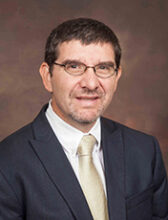Forestry and Natural Resources
Professor, Assistant Director of Extension and ANR Program Leader
Address:
615 W. State Street
West Lafayette, IN 47907
Curriculum Vitae
Why Extension?
Tell us about your background?
I obtained my BS in Industrial Production Engineering from the Costa Rica Institute of Technology (Costa Rica TEC). I worked for a commercial printing company before coming to Purdue as MS and PhD student in the Department of Forestry and Natural Resources. After completing my graduate education, I worked as a faculty member for Costa Rica TEC where I focused on undergraduate teaching and engagement with industry and communities. In 2008 I joined the Department of Sustainable Biomaterials at Virginia Tech as an extension specialist. At Virginia Tech, I developed a national extension program to increase the utilization of renewable materials to mitigate climate change, improve industry competitiveness and enhance livelihoods in rural communities. At Purdue, I am the Agriculture and Natural Resources (ANR) Program Leader where my main responsibilities are to provide leadership, strengthen and build on and off-campus relationships, articulate and communicate the ARN program’s vision, and to create a collaborative environment that fosters a culture of innovation.
How did you come to work on Wood Products? What do people need to know about it?
Years before I was born, my grandfather had purchased a piece of forestland in the high mountains of my hometown in Costa Rica. As other farmers, my grandfather did not see any value in the forest, so he decided to clear it for farming. This was a standard practice in Costa Rica from the 1950s to early 1980s that reduced forest coverage to less than 25%. Early in the 1990s, the government realized they had to introduce forest management sustainable practices. The main action plans were to incentivize reforestation using local and imported species and to reduce timber harvesting from natural forests.
My family became part of these initiatives, and in 1985, we reforested about 10 hectares. Years later, we also became members of the government program Payment for Environmental Services that seeks to protect the natural forest and promote reforestation. These programs allowed us to introduce sustainable forest management practices to harvest timber, protect water sources and wildlife and provide clean air and recreational opportunities. These family decisions had a huge impact on my perceptions of using natural resources to provide economic support while protecting the environment and creating social benefits.
How did you get involved with FNR Extension and outreach?
When I was a graduate student in Wood Products Technology at Purdue, I had the opportunity to participate in several Extension programs led by my former FNR advisor. I am a very service-oriented person and these Extension events were the perfect opportunity for me to connect and start developing relationships with individuals, industries and industry associations. Extension work opens a whole new set of development opportunities that a graduate student does not find through standard research and teaching activities. These engagements during my time as a graduate student were fundamental to seeking a career in Extension and outreach. A few years later I had the opportunity to create and develop my own Extension program at Virginia Tech as an Extension Specialist.
What do you enjoy most about your work?
The best part of being in Extension is the developing and nurturing of relationships with stakeholders. I truly enjoyed connecting and working with them through the dissemination of knowledge, research projects and participating in advisory boards to improve our industry and communities.
What is the biggest challenge you face in your job?
The biggest challenge I face in my job is to keep my programs relevant. There are many new ways today that individuals, communities, and industries can find technical information. For a significant percentage of our audiences, in-person delivery of Extension programs is still their best option. However, we also have to consider that other audiences prefer synchronous or asynchronous virtual programming. We need to find the right balance in how we deliver our programs. We also need to find innovative and faster mechanisms to support our stakeholders when new needs or emerging issues arise.
What part of your job did you least expect to be doing?
When I started as an Extension Specialist my immediate focus was on needs assessment, program development and delivery. A few months into my job I realized that without strong relationships and partnerships I was going to fail. The truth is that I was not well prepared to develop and nurture relationships. That is something that a college education does not really prepare you to do. So, I have put a lot of effort in learning how to build and maintain meaningful relationships with my stakeholders.
Do you have an outside hobby?
I truly enjoy the outdoors and farm work. I am a short-distance runner and a bike and mountain biker, too. More importantly, I love spending time with my wife and children.
 Purdue University - Extension - Forestry and Natural Resources
Purdue University - Extension - Forestry and Natural Resources
